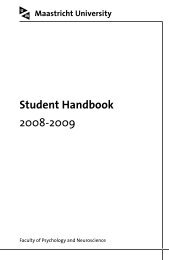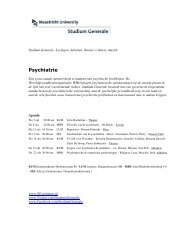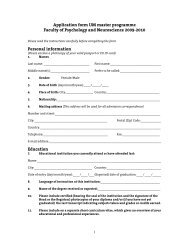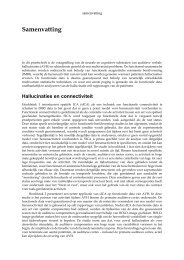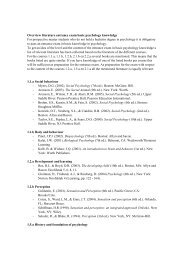Prospectus | 08/09 - Psychology and Neuroscience - Maastricht ...
Prospectus | 08/09 - Psychology and Neuroscience - Maastricht ...
Prospectus | 08/09 - Psychology and Neuroscience - Maastricht ...
You also want an ePaper? Increase the reach of your titles
YUMPU automatically turns print PDFs into web optimized ePapers that Google loves.
<strong>Prospectus</strong> Research Master <strong>Psychology</strong> 20<strong>08</strong> • 20<strong>09</strong><br />
or absolute). Also, Excel enables you to make various types of graphs, which can be<br />
very helpful for quickly visualizing your data. A fourth aspect that will be dealt with<br />
is pivot tables, a very helpful tool to organise your data in any manner you find most<br />
suitable for your further data h<strong>and</strong>ling. A final option that will be dealt with is the<br />
use of macros. These are especially helpful when repetitious changes in layout or<br />
recalculations have to be made.<br />
84<br />
Instructional Approach<br />
Group meetings in which direct demonstrations are given via PC/beamer. Students may<br />
provide the instructor data to be used as examples.<br />
Form of Assessment<br />
Written assignment.<br />
4.4 M&T workshops<br />
| 461NP Research Theory <strong>and</strong> Designs – 1 credit<br />
Coordinator: Bart Scholtissen, Psychiatry & Neuropsychology (FHML), Phone 38 84100,<br />
12 Dr. Tanslaan, Room 4.E3.007, E-mail: b.scholtissen@np.unimaas.nl<br />
Description of the Course<br />
The aim is to provide the student with a basic underst<strong>and</strong>ing of theoretical <strong>and</strong><br />
practical issues that are important for the execution of ‘evidence-based’ (intervention)<br />
research in the domain of brain & behaviour. This workshop will elaborate on basic<br />
issues of research theory <strong>and</strong> methodology of scientific research with a focus upon the<br />
domain of brain <strong>and</strong> behaviour. The student will get insight into issues involving ‘the<br />
empirical cycle’ <strong>and</strong> basic issues of science. Several methodological approaches in the<br />
domain of neuropsychology, neuropsychiatry, cognitive <strong>and</strong> behavioural neuroscience<br />
are presented <strong>and</strong> discussed. There are four sessions. The first three meetings of the<br />
workshop will be led by different senior researchers, who will each focus on different<br />
aspects of theory <strong>and</strong> methodology in the domain of brain <strong>and</strong> behaviour research.<br />
These three meetings will have an identical format, each consisting of two main parts.<br />
The first part is a lecture, which will focus on aspects of approaches, conceptualizations,<br />
<strong>and</strong> theoretical background in the various domains of neuropsychological research (e.g.<br />
cognitive, experimental, clinical, medical, developmental neuropsychology, cognitive<br />
neuroscience, basic neuroscience <strong>and</strong> clinical neuroscience). Furthermore, issues related<br />
to causality (e.g., causal or correlative inferences), issues related to the multifactorial<br />
nature of cognitive <strong>and</strong> behavioural functioning (e.g., biological versus environmental<br />
determinants), <strong>and</strong> issues related to possibilities for execution of neuropsychological<br />
research (designs, short overview of statistical approaches) will be discussed. During<br />
the second part, the focus will concern practical aspects of research theory <strong>and</strong><br />
design. During the final session, students’ presentations will form the basis of a group<br />
discussion on research theory <strong>and</strong> design.



